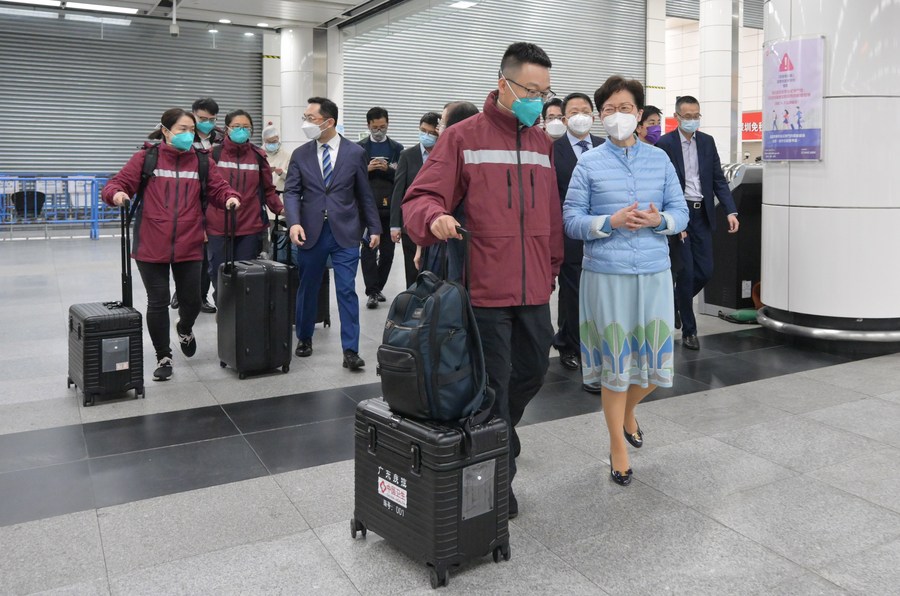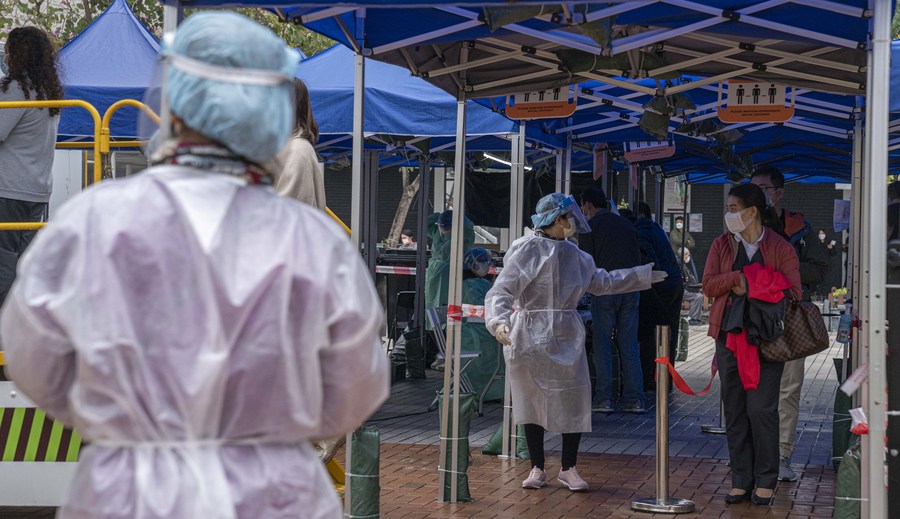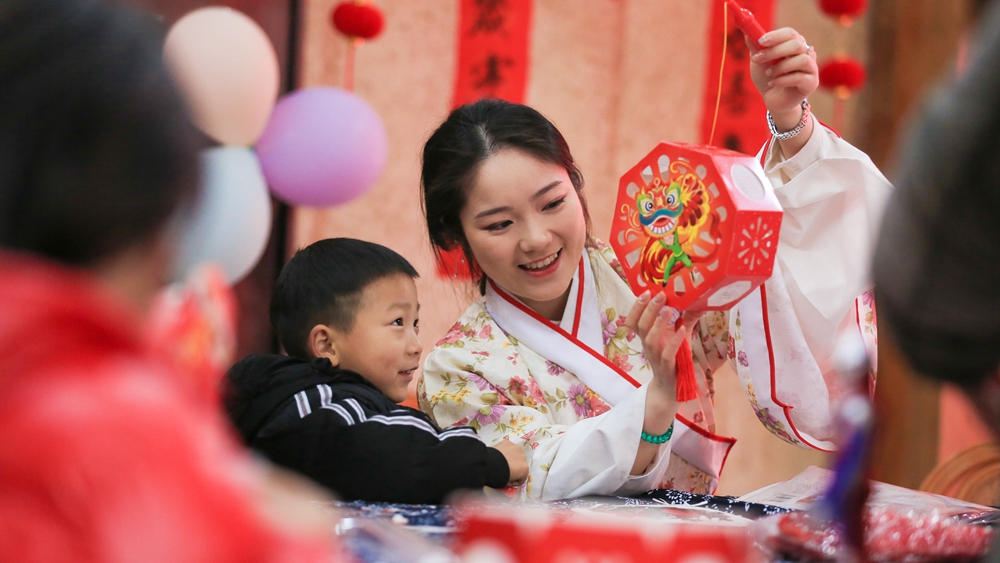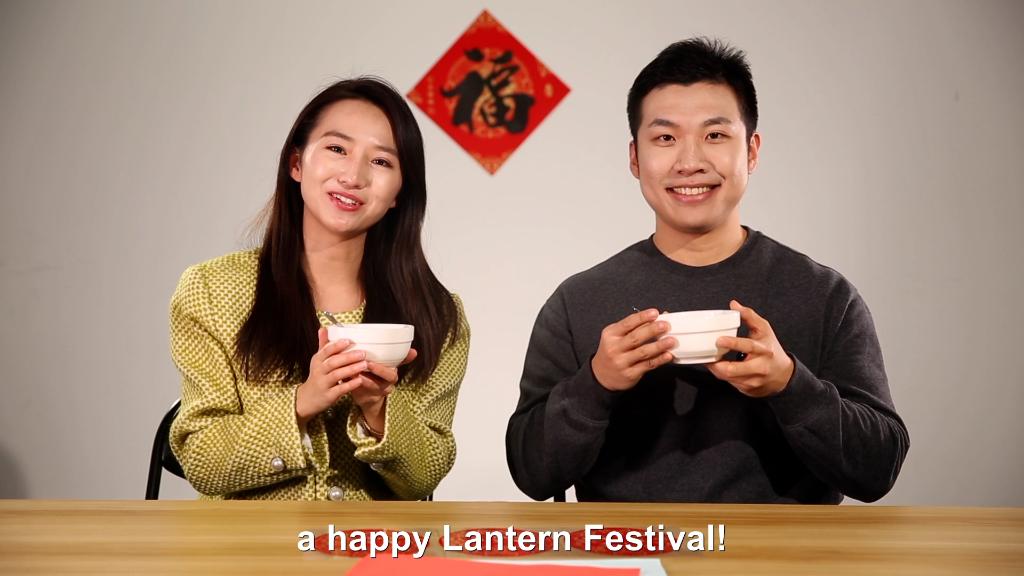-- Amid the fifth COVID-19 outbreak, HKSAR chief executive Carrie Lam vows to stand firm on the "dynamic zero-COVID" approach and spare no effort to enhance HK's testing, quarantine, treatment capacity and its vaccination rate.
-- The central government and Guangdong province are stepping up measures to guarantee the food and daily necessity supply to Hong Kong, and five task forces are being established to help HK to strengthen its testing and quarantine abilities.
by Xinhua writers Zheng Xin, Ma Xiaocheng
HONG KONG, Feb. 18 (Xinhua) -- With the latest strong support from the central authorities and people from the mainland, China's Hong Kong Special Administrative Region (HKSAR) has put all hands on deck for a must-win battle against the fifth wave of COVID-19 infections.
To implement the instructions of the central authorities on giving full support to Hong Kong to fight the epidemic, a panel of epidemiologists was dispatched from neighboring Guangdong Province to Hong Kong on Thursday.
The experts are expected to introduce the mainland's successful experience in controlling the Omicron variant of COVID-19, and conduct a comprehensive inspection and guidance on the anti-epidemic efforts in Hong Kong.

Carrie Lam (R, front), chief executive of the Hong Kong Special Administrative Region, welcomes epidemiology experts dispatched from neighboring Guangdong Province as they arrive in Hong Kong, south China, Feb. 17, 2022. (Xinhua)
The reinforcement came as the magnitude, pace and severity of the latest COVID-19 resurgence have outgrown Hong Kong's current handling capacity.
On Thursday, the global financial hub reported a record of more than 6,100 new COVID-19 cases and over 6,300 suspected infections.
"At this critical juncture, it is necessary for us to leverage the advantages of 'one country, two systems,'" HKSAR Chief Executive Carrie Lam said in a statement in response to the central authorities' support.
The HKSAR government will coordinate with relevant ministries and commissions of the central authorities, as well as the Guangdong provincial government, in COVID-19 testing, isolation and treatment to tackle the aggravating situation of the latest outbreak in Hong Kong, she said.
Although the epidemic situation is severe, Lam said Hong Kong's confidence in prevailing over COVID-19 derives from the country's robust support and the HKSAR government's strategy to combat the epidemic with strict prevention and control.

Citizens queue for COVID-19 testing at a mobile testing station in Hong Kong, south China, Feb. 17, 2022. (Xinhua/Lui Siu Wai)
OVERRIDING MISSION
Since the onset of the COVID-19 pandemic, Hong Kong has upheld its strict quarantine requirements to isolate newly-emerging positive cases. Its approach succeeded in keeping the city of 7.5 million people relatively virus-free, the highest daily local caseload recorded before 2022 was below 200.
Standing firm on the "dynamic zero-COVID" approach, which is to promptly detect and precisely contain the spread of the virus to nip any resurgences in the bud, Lam said the HKSAR government will assume the principal responsibility for the fight against COVID-19, continue to pursue zero infections, and will never give up.
Containing the fifth wave of the epidemic is now of paramount importance to the HKSAR government, which is making every effort to enhance Hong Kong's capacity in testing, quarantine and treatment, and to increase the vaccination rate.
Lam said the HKSAR government has already procured more than 100 million rapid antigen test (RAT) kits and will distribute them to priority groups as well as local residents in high-risk areas where sewage samples were tested positive for the coronavirus.

Children wait with their parents to receive COVID-19 vaccines at a community vaccination center for children in Hong Kong, south China, Feb. 16, 2022. (Xinhua)
As for quarantine facilities, she said some newly built public rental housing will be converted into isolation units. The HKSAR government is in talks with the hotel industry to acquire up to 10,000 hotel rooms for those who tested positive for COVID-19.
Members of the new Legislative Council have also played their active and constructive roles. Since the fifth wave began, they have advised the HKSAR government on how to fully leverage the support of the central authorities, among other issues.
"All sectors of the Hong Kong community have promptly answered calls to join the anti-epidemic fight in solidarity with government officials, demonstrating the spirit of Hong Kong residents to rise to the occasion in unity," Lam said.

Staff members check vegetables supplying the Hong Kong market in Wenjindu Customs of Shenzhen, south China's Guangdong Province, Feb. 11, 2022. (Xinhua)
STRONG MAINLAND BACKING
As part of a plan to beef up anti-epidemic support for Hong Kong, the central government and Guangdong Province will take measures to ensure the supply of food and daily necessities to Hong Kong, and five task forces will be established to strengthen Hong Kong's capacities in testing and quarantine, among others.
About 90 percent of fresh vegetables sold in Hong Kong come from the mainland. Wholesalers on the Chinese mainland are sparing no effort to ensure ample supplies.
"From Feb. 1 to Feb. 11, every day we sent more than 20 varieties of vegetables with an average of two to three vehicles to Hong Kong, and the total supply amounted to more than 200 tons," said a Shenzhen-based supplier named He Jiashun, who sources greens from Yunnan, Hubei and other parts of the country.
According to statistics from an industry association, 10 major Shenzhen-based food suppliers have provided over 200 tons of meat and 1,500 tons of vegetables to Hong Kong since the beginning of February. As supply from the mainland recovers after a virus-caused delivery backlog, prices are dropping to normal levels.

A mobile medical test vehicle arrives in Hong Kong, south China, Feb. 17, 2022. (Xinhua)
The rapid spread of the latest resurgence created a bottleneck in Hong Kong's nucleic acid test capacities, and technology companies from the Chinese mainland have come to break it.
On Feb. 15, the HKSAR government reopened the "Huo-Yan" (Fire-Eye) lab at Ma On Shan Sports Center to enhance the region's ability to trace and cut the COVID-19 transmission chains. Shenzhen-based BGI Genomics had spent more than a week preparing for the facility's relaunch.
"We have urgently mobilized about 200 staff from the mainland and they are arriving in Hong Kong," said Liu Xing, director of the lab. "Now, all our laboratories are running 24 hours a day."
"Huo-Yan" increases Hong Kong's daily testing capacity by 100,000 samples. If five-in-one mixed testing is adopted, the lab can process 500,000 samples per day.
Hong Kong is currently working to increase the number of tests, which will reach about 300,000 per day by the end of this month.
Lam said that with the support of the country, universal testing is feasible in Hong Kong, noting that the HKSAR government will mobilize all manpower and resources available, and take all measures to ensure the safety and health of the residents as well as the stability of Hong Kong.
The central authorities have always provided Hong Kong with the strongest backing. Lo Kam-yam, president of the Hong Kong Commerce and Industry Associations, said since its return to the motherland in 1997, Hong Kong has navigated every crisis with the full support of the central authorities.
(Video reporters: Zhang Yichi, Wan Houde, Li Sijia, Zhang Yue, Hu Nayun; Video editors: Zhang Qiru, Cao Ying)■












